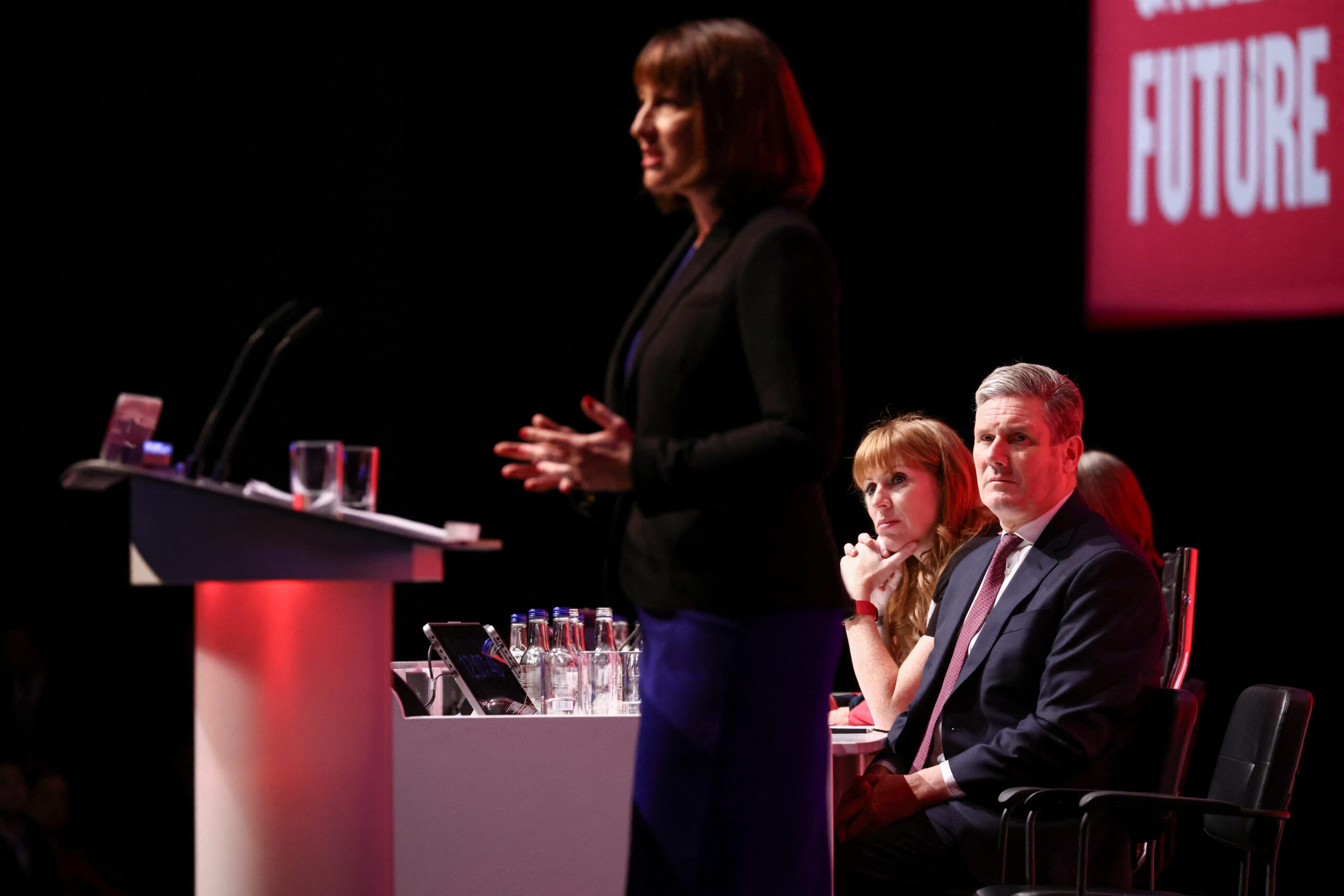Labour Will End Neoliberalism. Just Not in a Good Way
Rachel Reeves wants a new economic order, but won't end austerity.
by James Meadway
27 March 2024

Shadow chancellor Rachel Reeves last week gave the clearest outline yet of Labour’s plans for office – and it probably wasn’t what you think.
Speaking at this year’s Mais Lecture in the City of London, traditionally used by Shadow chancellors to lay out their economic vision, Reeves argued for a clean break with the “failures” of past Conservative and Labour governments. “We are in a moment of flux,” she claimed, comparable to the 1970s, “in which old certainties about economic management have been found wanting.”
That’s where her comparison to Margaret Thatcher came in – as a politician who supposedly ended the crisis and created a new consensus. Labour worked this line for all it was worth, winning admiring headlines in the Tory press. The Sun dubbed Reeves “the Iron lefty”. But it was pure spin.
Reeves’ speech was, in fact, a direct criticism of Margaret Thatcher, her chancellor, Nigel Lawson, and the legacy of Thatcherite economics. It even included a criticism of the last Labour government for sticking to the Thatcher script.
Labour’s next government will be a self-conscious attempt to break decisively with the typical economic policies of the last four decades – usually called neoliberalism.
But ending neoliberalism does not necessarily mean replacing it with something better.
Governments since 1979 have either promoted neoliberalism and austerity (Thatcher, Cameron), or promoted neoliberalism and increased spending (Blair). Jeremy Corbyn’s Labour offered an end to neoliberalism, and more spending. Keir Starmer’s Labour is offering something radically new: a turn against neoliberalism, combined with a worsening of austerity. Nothing like this has been seen before in Britain.
Reeves said that a Labour government will use an “active state” to promote domestic industry. She identifies this as part of a turn against neoliberalism globally, citing a new “Washington consensus” and using Joe Biden as her example.
But what she is very clearly not promising is the spending that could make these promises work. Bidenomics means big investment spending – at least $780bn over the rest of this decade, equivalent to £617bn.
Labour, by contrast, remains committed to further austerity after the next election. Its flagship £28bn-a-year green spending promise was unceremoniously ditched.
To try and think about what is happening, we can put it in terms borrowed from Marx, and Marxist feminism. Since the Second World War, Labour and similar parties across Europe have been heavily concerned with “social reproduction” – meaning those functions under capitalism that make sure workers can still be productive: healthcare, education, childcare, and so on. So New Labour in office substantially increased spending on the NHS and schools, for example, or opening Sure Start centres to provide support for very young children and their parents.
What social democratic parties like Labour have been less consistently concerned with is production – the actual organisation of work itself.
New Labour was the most extreme example of this, infamously granting financial services “light touch” regulation, promoting free trade, and actively cutting support for industry. This combination is what made New Labour distinctive – traditional social democratic concerns with social reproduction alongside a total embrace of neoliberalism in production.
Reeves and Starmer’s Labour flips this on its head. Some public services will be subject to extended neoliberalism and privatisation, notably including the NHS under likely health secretary, Wes Streeting. But the “active state” will be presumably busily trying to promote private investment in various favoured sectors, like defence and green technology.
The nearest parallel I can think of is the rescue of the British car industry after the 2008 crisis. This involved industrial strategy and government intervention – overseen by Peter Mandelson of all people – for a key sector, supporting demand and rebuilding supply chains, whilst also continuing with the broad outlines of neoliberal policy elsewhere. Mandelson himself, writing in the Sunday Times over last weekend, identified in Reeves’ speech a “laser-like focus on raising investment… with government mitigating risks and incentivising investment”. It’s pretty clear he thinks this is a reprise of his time as business secretary at the end of the 2000s.
In terms of the Labour party, the tradition it is closest to is not New Labour. It’s more like the “Old Right”. This almost-forgotten section of the Labour party tradition is closely associated with the right-wing of the trade union movement, and very concerned with the specific interests of historically a narrow band of relatively skilled workers – so, rights for trade unions, something Reeves stressed, but no real concern with “social reproduction” spending.
It is almost certain to fail, and how it fails will define the possibilities for the left in Britain over the rest of this decade and beyond.
The first problem is the lack of meaningful support for any such programme. The social base of manufacturing workers is today tiny, at less than 8% of all employment, down from 17% the last time Labour entered office. The majority of workers in Britain are working in services, from food retail to tourism, and about half of those are in the public sector. This is Labour’s actual base of support and it is strongly tied to public spending. And even Reeves’ pledge on expanded union rights is already under attack from the likes of Mandelson.
Second, there is no real prospect of Labour getting through years of minimal spending on public services that have been cut to the ground. Their hope is that “growth” will deliver the goods, but even if this happens it will take years to appear. Reeves will launch an “emergency budget” when she arrives in No.11, which should get Labour through a winter NHS crisis this year, assuming an autumn election. But what about the next, and the next?
Third, Labour’s pivot to focusing on production is happening at precisely the point where the economic crisis is increasingly manifesting as a crisis of social reproduction. It is the crisis of care, with half a million people denied the social care they need; of healthcare with record NHS waiting lists and falling life expectancy; of childcare that most parents can’t afford; of collapsing school buildings and university course closures.
The public’s political response to this may not emerge in ways that the left would like. Already a farmers’ movement is sharpening its proverbial pitchforks, modeled on similar movements across Europe. These have tended to focus on cutting environmental spending, and have been colonised by the radical right – with some exceptions, as Confederation Paysanne in France has shown. Fuel protests, allied to anti-traffic calming measures seem likely, similar to those early in Blair’s first term.
These are not traditional left demands, even if they centre on different aspects of the ecological crisis, of which the cost of living crisis is a subset. But as Don’t Pay demonstrated in the energy crisis of 2022, it will be possible for the left to take the initiative. The harder task will be in developing a political programme that gets beyond single-issue demands.
The next few years are likely to be increasingly chaotic. Labour have set out an ambitious plan for government. But by failing to build on either its real base of support, and by not directly addressing the crises that millions of us face – from failing public services to climate change – the party leadership is setting itself up for failure.
James Meadway is an economist.


